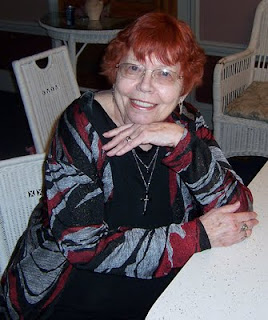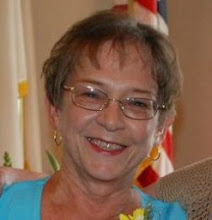Happy New Year, everyone!
On the whole, 2011 was kinder to me than the prior several years were. I guess that makes me an exception to the rule. But my independent editing business picked up, three of my books were published (along with a short story I published on Kindle when I got so sick of writing the book I was writing, and decided to stick it in a drawer and do something else).
Then December happened. You know how it goes: if things are going along smoothly something will hit you upside the head to remind you that life isn’t a bowl of cherries. On or about December 8, the retina in my left eyeball detached itself from whatever it was supposed to be attached to. I felt something funny in that eye, but thought I was being sort of hypochondriacal when I called the eye doc for an appointment. However, when I described my symptoms to the appointment lady, she gave me an appointment for far too early on Friday morning.
After being dilated and poked and prodded and blah, blah, blah, they stuck me in a room, called a place called Eye Associates in Albuquerque, told me to pack a bag and get myself to Albuquerque instantly. As I sat in the little waiting room, waiting and worrying, I called my wonderful neighbors, Ann and Barry Lasky. Ann said she’d be happy to drive me to Albuquerque, Barry said he’d feed my dogs, and we set out.
Unfortunately, neither Ann nor I had any idea what to expect once we got to Eye Associates. All I knew was that a doctor was waiting for me to show up (I honestly didn’t realize a detached retina was considered a medical emergency. I do now). So my eye was dilated again, again examined, Dr. Sidd’s (he’s the Roswell eye doc) diagnosis was confirmed, and I was told to show up at Presbyterian Hospital in Abq. at some ungodly hour on Saturday morning. That’s when we learned that Ann was supposed to stay with me for the entire weekend, and that we’d have to get rooms at a hotel.
Well, what the heck, y’know? I’d been making a tiny bit more money than usual in recent months, thanks to my independent editing work, so I could actually afford to house us at Albuquerque’s Hotel Elegante, a wonderfully misnamed hotel at which the New Mexico Book of the Year Awards banquet was held a few weeks earlier. So I got to spend a lot of time in the Hotel Elegante during the last part of 2011. Ann’s husband Barry brought her some clothes on Saturday (by the way, it’s a 400-mile round trip from Roswell to Albuquerque and back again), and he also brought both of us our laptops, so we were able to communicate with the rest of the world.
Then, on Saturday, December 10, a very nice Dr. Kamalesh Ramaiya reattached my left retina to whatever it’s supposed to be attached to, lasered another weak spot in the same eyeball, installed a gas bubble (which is supposed to dissolve about six weeks from the date of the operation), and I’ve been a one-eyed, extremely bored person ever since. Can’t read. Can’t watch TV. Can’t drive (for the sake of the rest of the world as well as myself). Can’t even go for walks with the dogs. I get to lie face-down on my bed with my head in the holes of a foam-rubber pillow for the duration. If it weren’t for audiobooks, I’d be totally nuts instead of merely partially nuts, as is normal.
The problem is that I am unable to work. I am also unable to fulfill my obligation to the people who have won books in various contests. That, however, doesn’t mean I’ll always be incapacitated. As soon as I can read again, I’ll send books to everybody to whom I owe books!
These folks include winners of November’s contest and this month’s contest wieners, Brenda Williamson and Jacquie Seewald, who each won copies of GENTEEL SPIRITS in my December contest.
Also, anon at book9k@woway.com and Karen Mayers, who were kind enough to leave comments on our Magical Christmas Mystery Book Blog Tour, out of which I had to drop precipitately when my eye done me wrong, also won books. If you two could send me your home addresses at alice@aliceduncan.net I’ll eventually get your books to you. Of course, you’ll need to decide which books you want first. You can choose by looking at my web site: www.aliceduncan.net
Anyone who wants to enter my January contest (I’ll be giving away two copies of ANCIENT SPIRITS, Daisy Gumm Majesty’s sixth [and perhaps last] adventure) please send your name and home address to the same e-mail address: alice@aliceduncan.net
As for 2012: onward and upward! Forward into the unknown! As P.G. Wodehouse wrote: the future lies ahead!
Okay, I’ll quit now. Thank you. And please do have a happy new year!

















